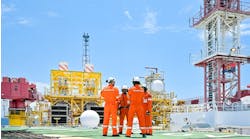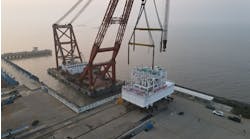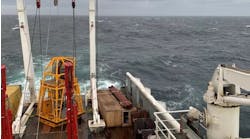MODEC unveils next-generation FPSO hulls
MODEC expects demand to keep rising for newbuild FPSO hulls and has therefore joined forces with Mitsui E&S Shipbuilding to develop MODEC NOAH. This is based on a next-generation hull design for FPSOs already developed by Mitsui called the noah-FPSO Hull (NOAH standing for new offshore adapted hull). However, MODEC NOAH is MODEC’s own new hull design, developed to maximize the lifecycle value that each FPSO can provide to beyond 20 years.
The design addresses the technical limitations in oil tanker-converted FPSOs.
The main features are:
1. Adaptable to a wide range of shipyards globally
2. Large deck area to support larger, heavier, and more complex topsides
3. Modular design, accommodating wide-ranging requirements including various mooring configurations
4. Standardization of fore/aft modules and the parallel-body module with adjustable lengths that can be constructed separately at different shipyards. This broadens the options for construction locations and adds scheduling flexibility, based on dock availability
5. Unique hull form comprising flat or 2D bending plates that are said to cut construction costs while maintaining seakeeping properties and minimizing the impact of green water and slamming loads
6. Hull design favorable to machinery room volume, with beneficial changes for the functionality of piping, and improved safety of the living quarters
7. Hull form allows storage tanks to be continuously inspected (during stable operations) by providing sufficient inspection access
8. Work-efficient layout for maintenance required during the long-term operations
9. More comfortable living area for crew members.
The company has received approval in principle (AiP) for the new design from ABS, Bureau Veritas, and DNV GL.
It has also developed a second next-generation newbuild FPSO hull, the M350, which has received AiPs from ABS and DNV GL. The hull has been developed with Dalian Shipbuilding Industry Co. in China.FPSO market gearing up for revival
The global market for FPSOs is headed for a major renaissance with as many as 24 awards expected by 2020, driven mostly by Brazil, according to analyst Rystad Energy.
South America leads the pack with 12 sanctioned FPSO projects planned by the end of next year, followed by Asia with four, Europe and Africa with three each, and two more in Australia.
Rystad expects Brazil – currently witnessing an influx of international E&P companies – to contract seven more FPSOs in 2020, thereby bringing the country’s tally to more than one-third of the awards anticipated globally this year and next.
Audun Martinsen, head of oilfield services research at Rystad Energy, said: “The ongoing upswing in newly sanctioned FPSO projects points to a brighter future for the FPSO market. Offshore operators are finding their footing again after the downturn of 2014, as a robust rise in free cash flow has fueled a significant uptick in deepwater investments.”
The FPSO boom in South America is mainly the result of large investments in deepwater exploration and field development. Another important factor has been Brazil’s recent relaxation of local content regulations, which has attracted new international players to the table, the analyst said.
“With improved economic viability resulting from ongoing standardization measures, coupled with growing deepwater investments, FPSOs are likely to continue to emerge as an attractive development option for many fields in all corners of the world, in both deep and shallow water,” Martinsen added.
FPSO contractors Yinson and MODEC are particularly well-positioned to benefit from this upswing through the next wave of contract awards, according to Rystad’s projections. •





